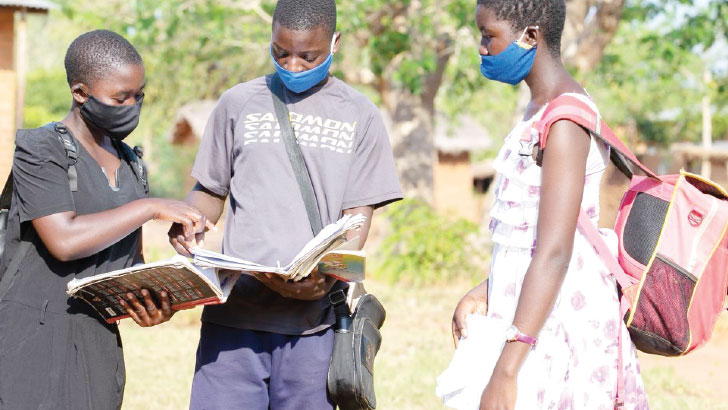Guide them while young
Every day, 17-year-old Khadija Selemani walks about 15 kilometres to school—thrice the maximum distance every Malawian child should cover to learn.
As she paces from home to Nsondole Community Day Secondary School (CDSS) in Mbwani Village, Traditional Authority Kumtumanji in Zomba District, Khadija firmly hopes to become an accountant.
The Form Three student is obsessed with figures, making mathematics her favourite subject.
Besides, her daring attitude drives her to beat boys in whatever she does.

“Most Malawians look down on us, girls. They think we are not as brainy as boys. I dislike that. This distaste has strengthened a sense of defiance that always pushes me to be top of the class, not just equal to boys. I want to show the world that what they can do, I can also do,” she says
But Khadija requires more than just fortitude and passion in mathematics to achieve her ambition.
Like any other learner, she needs professional mentorship to shine a line on her desired career path and what it takes to achieve her goal.
Surprisingly, despite being just a class away from finishing her secondary education, the rural teenager says she has never undergone any career guidance session.
Her only role models are her teachers as prominent professionals in her preferred career keep shunning rural areas in favour of towns and cities.
“I know it is not as easy for me to achieve my dreams. I will need a lot than just academic excellence, but still this is a dream I am holding on to,” she says.
Headteacher Richard Tomoka says lack of motivators is a huge challenge for the girls at risk of getting married or falling pregnant before their dreams come true.
He reckons many children either quit school or stray into unwanted careers because of lacking proper mentorship while still in school.
“Once they fail to find a slot within their desired careers, their focus tends to be derailed,” he says, adding: “Most students think that after school, they will instantly get lucrative jobs in any field they want. Their preferences are mostly based on shaky foundations and insights.”
The headteacher and his teaching staff sometimes sacrifice their time to guide the learners on career choices, but their efforts remain sporadic and less impactful because of a high workload and contempt bred by familiarity.
To close the gap, the Technical Education, Vocational and Entrepreneurial Training (Tevet) Authority has introduced a career guidance interventions to catch boys and girls before they complete secondary education.
The career guidance sessions with both primary and secondary school learners across Malawi signpost them to a diversity of opportunities the Tevet system offers.
According to Tevet Authority regional manager for the South Conceptor Kachoka, the career guides will reach about 200 primary and secondary schools in the South.
She explains: “If we look at the Tevet sector, there is a prevalent notion which makes youth look down upon the sector. All they focus on is going to the university after finishing their secondary education.
“During the career talks, we are also sharing with them the government’s vision which promotes skills development as a backbone for our economy. We are informing the learners how they can access the programmes under the sector.”
Kachoka said the imbalances prevalent during enrolment in various Tevet programmes point to lack of information-sharing within the country’s education and Tevet system.
“Although most Malawians are doing construction projects now, it is ironic that during Tevet enrolment, not many apply for relevant courses such as bricklaying as well as carpentry and joinery,” she laments.
Realising how low learners consider the Tevet sector, the organisation has introduced a number of incentives within the programme.
This includes subsidising training in all the technical colleges regardless of whether they are national or community technical college.
Kachoka says: “We are also informing the boys and girls how the facility can equally pay for them as in meeting the needs of students who have problems in accessing fees because we have a special bursary for boys and girls.
“We also have a merit scholarship which is just for females in hard skill areas.”
For young people like Khadija, this is an awakening she needs to make her dreams come to fruition.
She says: “If I cannot make it to university, whose enrolment is limited by bed space, the Tevet system offers me an equally important route to achieve my goals.
“After all, my parents cannot afford to send me to any of the private universities in the country.”





